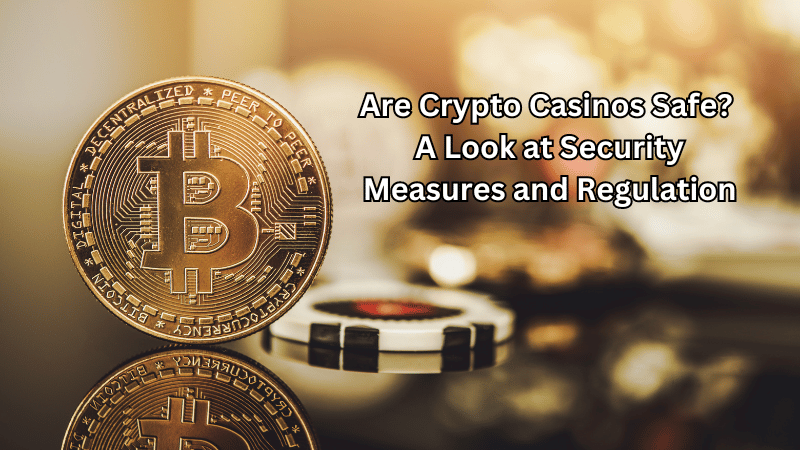The rise of crypto casinos has brought both excitement and skepticism to the world of online gambling. With the appeal of decentralized, anonymous transactions, many players are drawn to the flexibility and security that cryptocurrencies offer. However, questions surrounding the safety of these platforms persist. Are crypto casinos really as secure as they claim? In this article, we’ll dive into the security measures and regulatory landscape that define the safety of crypto casinos.
Security Measures in Crypto Casinos
- Blockchain Technology The backbone of crypto casinos is blockchain technology, which ensures transparency and security through decentralized ledgers. Blockchain allows players to track transactions, ensuring that all funds are secure and tamper-proof. This technology makes it difficult for third parties to alter transaction data, adding an extra layer of trust to the system.
- Encryption Protocols Crypto casinos utilize advanced encryption protocols to safeguard user information and financial transactions. With technologies like SSL (Secure Socket Layer) encryption, data transmitted between players and casinos is protected from potential hacking attempts. This means that even though your identity may remain anonymous, your personal data remains secure.
- Two-Factor Authentication (2FA) Many reputable crypto casinos implement two-factor authentication to prevent unauthorized access. This adds an extra layer of security by requiring players to verify their identity using a second form of authentication, such as a mobile app or email confirmation. This ensures that even if your account credentials are compromised, it’s still difficult for hackers to access your funds.
- Cold Wallets for Cryptocurrency Storage To protect player funds from cyberattacks, many crypto casinos store a large portion of their cryptocurrency holdings in cold wallets—offline storage that isn’t connected to the internet. This minimizes the risk of funds being stolen in the event of a hack, as cold wallets are virtually immune to online threats.
Regulatory Landscape for Crypto Casinos
- Licensing and Regulation One of the main concerns players have is whether crypto casinos are subject to regulation. While traditional online casinos are typically regulated by gambling authorities, the regulatory environment for crypto casinos is still developing. However, many crypto casinos operate under licenses from jurisdictions such as Malta, Curacao, and the United Kingdom, which enforce strict standards for fairness and security.
- KYC (Know Your Customer) Policies Some crypto casinos require players to adhere to KYC policies, which ensure that the casino knows the identity of its players. Although this may seem to contradict the anonymous nature of cryptocurrency, it’s a vital step in preventing money laundering and fraud. KYC policies also help players feel more secure, as they know the platform is taking measures to verify identities and ensure fair play.
- Provably Fair Gaming A key feature of crypto casinos is the implementation of provably fair gaming systems. These systems allow players to verify the fairness of each game outcome through cryptographic algorithms. Unlike traditional casinos, where players have to trust the platform’s claims of fairness, crypto casinos provide transparency, enabling players to confirm that games are free from manipulation.
- Challenges in Global Regulation While some jurisdictions are embracing crypto casinos, others remain cautious. The decentralized nature of cryptocurrencies means that international regulatory frameworks are still catching up. Some countries impose strict regulations or outright bans, making it crucial for players to verify the legal status of crypto casinos in their own regions.
Balancing the Risks
- Anonymity vs. Accountability One of the major advantages of using cryptocurrencies is the anonymity they provide, but this can also be a double-edged sword. Anonymity may attract bad actors, making it harder to track fraudulent activity. For this reason, players should always opt for licensed crypto casinos that follow strict regulatory guidelines and KYC protocols to balance security with privacy.
- Security Breaches While many crypto casinos implement robust security measures, no system is completely immune to breaches. Players should look for casinos with a proven track record of handling security incidents responsibly, such as those that offer compensation for losses due to hacking.
Conclusion
Crypto casinos offer a range of benefits, from enhanced privacy to cutting-edge security features like blockchain technology and cold wallet storage. However, the safety of these platforms ultimately depends on the regulatory environment and the specific security measures each casino employs. By choosing licensed, reputable platforms that adhere to KYC and provably fair gaming practices, players can enjoy the advantages of crypto casinos while minimizing risks. As the regulatory landscape continues to evolve, we can expect crypto casinos to become even safer for users around the world.









